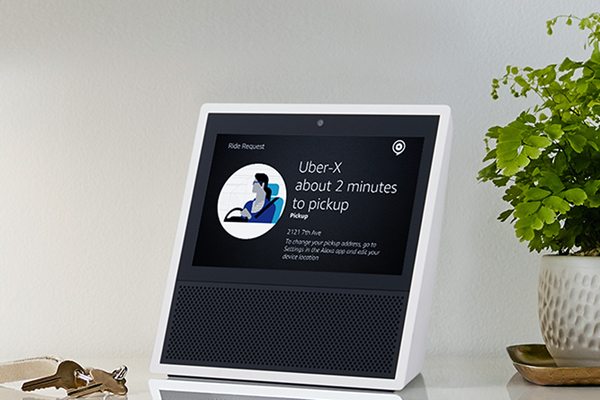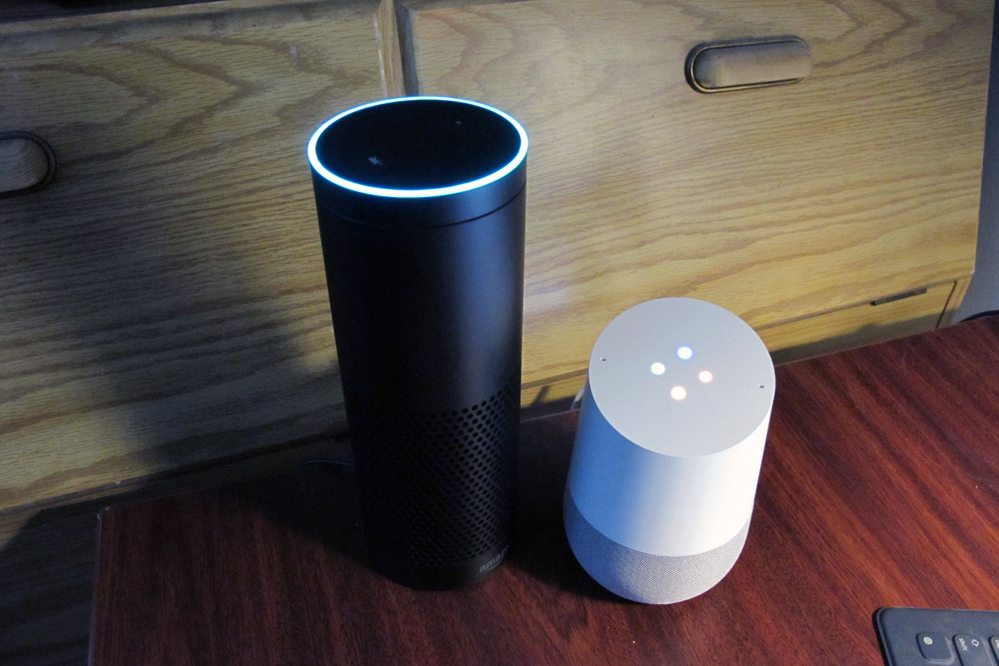Skift Take
Despite the hype, neither the Amazon Echo nor the Google Home is delivering the goods yet for voice-command travel research. Google's effort has the most promise, though.
On Tuesday Amazon aimed to retain its dominance in the sales of voice-powered Internet devices by beginning to take orders for a new device, Echo Show, which has a screen and basic video-conferencing features.
Amazon leads the market for voice-activated personal assistants. Analysts estimate that the company has sold between 8 million and 11 million of its speakers since all-but-pioneering the device category in 2014.
But Google has gained ground since it launched a competitor device, Google Home, last November. Earlier this week research firm eMarketer estimated that Google has already gained the second-highest market share, at 24 percent.
Last month Google added several flight-search commands to Google Home. Users can ask general questions, such as how much flights to a particular city or country cost.
In Skift’s tests of Google Home and Amazon Echo, neither device wowed. The biggest drawback is that none of them yet allow voice-powered flight or hotel booking.
Google’s interface offers some advantages over Amazon’s.
For instance, a person can say, “Okay, Google, how much are flights to Montreal?” and get baseline results from one’s local airport. Google Home will ask questions about the person’s preferred dates of travel and will offer to set up email alerts to track flight prices for a general location or date (though not yet a specific flight or airline).
Amazon depends on third-parties to develop its travel “skills,” or basic functions. Kayak has the best of these, in Skift’s tests. But a person must speak the awkward phrase, “Alexa, ask Kayak how much are flights to Montreal?” and then be guided through prompts to name ideal travel dates.
Kayak offers helpful context, such as the difference in starting prices for flights, breaking out nonstop flights from flights with layovers. But it doesn’t offer email alerts via Echo.
One way that Google Home has an advantage over Amazon Echo is in the ability to tap into other data if a consumer is a user of Google services like Gmail and Calendar. Google Home can pull up itinerary information saved in those services, which makes it faster to check on flight status for a particular trip — regardless of whatever website the trip was booked through.
In contrast, Kayak can only find and fetch information on trips booked through its website or mobile app.
Google’s edge
If Google can get its act together, then it will leverage the data it has collected and analyzed as a search engine to provide superior results at the travel inspirational level (such as when consumers are deciding where to go given a budget) and at the practical, day-of-travel level (such as what’s the status of the flight a traveler is taking today).
A year ago, the Mountain View, CA-based giant said it was making a large investment in conversational interfaces and the artificial intelligence that lies behind such interfaces.
Presumably Google Home will soon incorporate the destination recommendation advice that the search giant rolled out a year ago.
Comparing vacation package prices, something Google is experimenting with among some desktop users in Europe, might also lend itself well to the rough-and-ready, total budget type of estimates a person using a voice-enabled device may want while washing the proverbial dishes.
Amazon’s pervasiveness and early lead
It’s a truism is that people’s favorite device is the one they use the most, not necessarily the one with the best features. Witness how camera phones have all-but-replaced digital cameras with more powerful lenses and other features.
In that context, Amazon has positioned itself well when it comes to sales of voice-based assistants, particularly in the U.S., the UK, and Germany.
It’s curious how travel, so far, has not been a popular planning activity among the users of Echo devices. As of today, travel doesn’t make it into Amazon’s list of the most popular Alexa skills.
One problem is that most of the 250 “travel and transportation skills” listed are wastes of time, in Skift’s testing and judgment.

Screens May Be a Travel Game-Changer
Amazon’s move to add a 7-inch touch screen to the Echo may mean that its partners such as Kayak will be able to add search results in response to user queries in a more digestible fashion.
Given the complexity of travel, having more than just one or two results to a query can improve the confidence of the user that the results are worthwhile.
For example, in a test today of the non-screen Echo, we asked Kayak, via Alexa, for a hotel recommendation in Miami for this June. Kayak, via Echo, suggested just one hotel, across a half-dozen searches for different dates, in some sort of software glitch.
Via Kayak, Echo says, “Looking for rooms in Miami from June 16 to June 18, a top result is the Mandarin Oriental, Miami, a five-star hotel close to the city center with excellent reviews for $293 per night. Would you like to do another search?”
As the example shows, the voice-based nature of Echo’s results limits how many listings are named, which reduces a customer’s confidence in the quality of the results.
Yet the screen on the new Echo Show could provide a handful of search results, if Kayak and other partners choose to build the capabilities to supply those results. That might improve a user’s confidence in the narrowed down recommendations.
More importantly, travel inspiration is visual in nature, and the ability to offer images of a destination or of products, such as the type of car being offered for rental, could help improve people’s interest in doing voice-powered travel searches.
A lot of work to be done
Without a screen, travel companies will have to work harder at exploring the best way to make voice-powered search work for consumers.
The results so far have been weak for what is, admittedly, an enormous technical challenge to translate human speech queries into commands and to deliver easy-to-comprehend, useful responses.
Kayak’s Alexa skill has received 70 ratings, with a 2.5 out of 5 star average review.
Price-comparison rival Skyscanner has an Alexa skill, too, but it has fewer and worse ratings. In our tests, it did not perform as well as Kayak’s skill in answering basic questions, though both promise to deliver comparable answers in their marketing materials.
Expedia waiting in the wings
Given that Expedia’s Bellevue, Wash., headquarters and Amazon’s Seattle headquarters are so close by, and given that Expedia was early to embrace Alexa, many industry people expect the company will do more testing with voice-powered search soon.
Last October, Expedia chief executive Dara Khosrowshahi peered into his crystal ball at the Skift Global Forum and predicted that voice-powered search would become a key consumer expectation in the coming years.
Last November, at Expedia’s conference for key vendors and agencies, president for Brand Expedia Group Aman Bhutani echoed Khosrowshahi’s thoughts about the devices, noting that the Echo is a beloved device in his household by his kids and relatives.
So far, Expedia’s Alexa effort has not yet matched the hype. Last November, Expedia debuted Alexa functionality that enables customers of the online travel agency to check on flight reservations booked on Expedia via an Echo device.
Several months on, Expedia’s Alexa skill has only 20 reviews, and an average rating of only three stars out of five.
So far, in our tests today, Expedia’s functionality on Echo was not able to provide the same level of inspirational information about whether some destinations are more affordable to visit than others with the same ease as Google Home and Alexa’s Kayak-powered service.
That said, a review of the types of positions it has advertised for since then shows a preference for engineers who can develop voice-based systems for handling customer service complaints rather than powering Echo-style search.
It seems like that Expedia’s “skill” on Alexa will be enhanced later this year, but it appears unlikely that there will be a quantum-level improvement beyond matching what Google and Kayak already do.
There are other players in the voice-powered game, of course. Microsoft’s voice-enabled Cortana software is powering Harman’s Invoke speakers, which will debut this autumn.
Apple may use its voice-activated Siri technology in fresh new way soon, too, with possible travel implications.
Overall, eMarketer forecasts that, by the end of this year, 35 million Americans will be using a voice-activated assistant device at least once a month.
The question many consumers may be asking is how long it will take before high-quality travel search comes to these voice-powered assistants.
The Daily Newsletter
Our daily coverage of the global travel industry. Written by editors and analysts from across Skift’s brands.
Have a confidential tip for Skift? Get in touch
Tags: amazon, google, voice search
Photo credit: Okay, Alexa and Google: Which voice-enabled speaker will win the travel search wars? Skift
